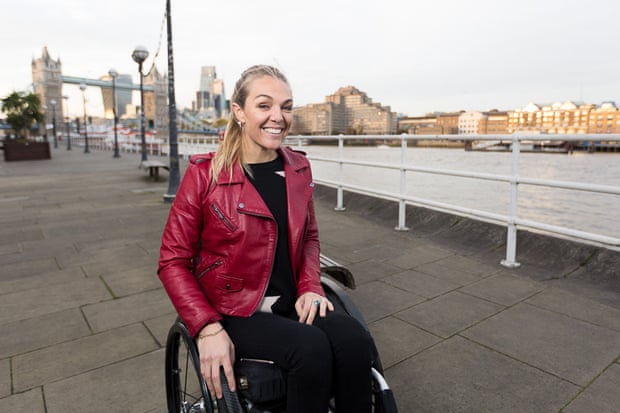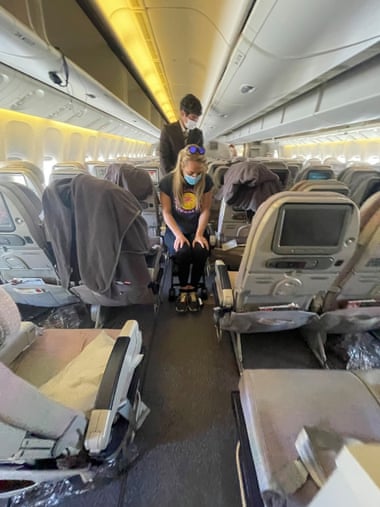‘I have to plan for if I am stranded, if I am dropped, if my chair is damaged’:
Sophie Morgan is fed up. The TV presenter, best known for her appearances on Loose Women and presenting the Paralympics, travels all the time for work – she films all over the world – and she knows what she is doing. But, because she is a wheelchair user, “every single flight is a risk”, she says.
For disabled people such as Morgan and me, air travel is perhaps uniquely stressful. There are so many things that can go wrong, alongside a shocking lack of dignity. Will they allow our wheelchair through security, or will we be forced on to airport chairs that we can’t use independently? Will the wheelchair be left behind at the gate, leaving us stranded? Will it be broken en route, ruining a work trip or a holiday? Will assistance come before boarding closes? Will we be hurt as we are manhandled on to the plane?
None of these worries, however, come close to the big one: are we going to be left behind? Once all the passengers are off, this question rumbles around our heads as we crane to see whether assistance is coming. If it doesn’t come, we are stranded. Despite there having been years of campaigning for wheelchairs to be stored in the cabin, most airlines insist on sending them down to the hold. This means there is often a delay in bringing the chair back up to the cabin door at the end of the flight. And, of course, planes are still designed with aisles too narrow for standard wheelchairs, meaning anyone who can’t walk off the plane must wait for staff to help them with a specially made aisle chair (which is not designed to be used independently).
This problem finally came to public attention in June when a disabled passenger died at Gatwick airport after falling from an escalator. He had chosen not to wait for assistance. While Gatwick and Wilson James, the company responsible for assistance at the airport, said there wasn’t a shortage of staff at the time, all disabled people know that adequate staffing is no guarantee we won’t be left behind. If you are in desperate need of the loo, because you haven’t been able to go on the plane (it is 2022, but airlines still don’t provide disabled toilets), sometimes the only option is to take matters into your own hands.

It happens all the time, says Morgan. In April, she was stranded when she returned from a filming trip in Helsinki. She hadn’t been warned in advance that the plane didn’t carry an aisle chair, so she spent the entire flight stressed about being unable to go to the toilet. She was desperate to get off the plane to be reunited with her wheelchair and her autonomy, but no assistant arrived.
She asked the cabin crew how long the wait would be. “They just shrugged. No one offered any reassurance,” she says. “Meanwhile, I’m terrified I’m not going to get to the loo in time.” Her travelling companion could see her wheelchair on the bridge, but she had no way to reach it. Forty minutes after landing, an assistant appeared – but they couldn’t help Morgan use the aisle chair. They hadn’t been trained and were obliged to wait for another member of staff. There was no apology.
Eventually, Morgan’s companion did what many are forced to do: he grabbed the aisle chair and got her off the plane himself. “Definitely against insurance policy,” Morgan says, half laughing, half groaning. Even once she was in her own wheelchair, no one helped – or apologised.
This is just one of Morgan’s many stories of being denied the assistance she needs and to which she is entitled. I ask how she maintains the confidence to travel so often. “I travel a lot, but never without fear,” she says. “It sounds awful, but I just expect the worst, then I plan what I’ll do if the worst happens – if I wet myself, if I’m stranded, if I’m dropped, if my chair is damaged. I’m always kind of in a state of distress.”
The distress is heightened because, in order to avoid needing the loo too soon, she restricts her food and drink intake the day before she flies. (On long-haul flights, there is usually an aisle chair, but if you need a carer or can’t stand at all, you just have to wait.) It is a degrading choice to make, but “in the end, travelling is so worth it. I think of it like an extreme sport – I know there’s every chance it’s going to end in tears, but if I want to do it, I’ve got to risk it.”

Most disabled people know the gnawing stress of air travel, but everyday journeys can be just as anxiety-inducing. Many will be familiar with the almost mundane experience of being left stranded on a train. Shona Louise, a theatre photographer, often travels around the UK for work, particularly in and out of London, from her home in St Albans. “Ninety per cent of the time, especially on routes I know, everything is fine,” she says, emphasising that she doesn’t want to put other…
Read More: ‘I have to plan for if I am stranded, if I am dropped, if my chair is damaged’:

